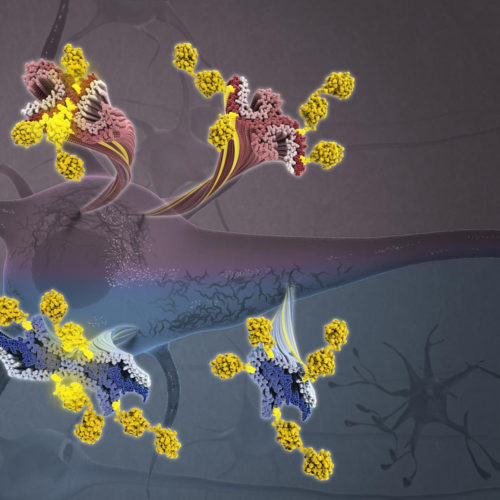Two drugs have failed to slow memory loss and cognitive decline in people in the early stages of a rare, inherited form of Alzheimer’s disease in a new clinical trial, researchers report. The researchers continue to explore data from the trial’s cognitive and clinical outcomes, however, and await analyses of biomarkers and other information so...
Tag: <span>Alzheimers</span>
How flickering light can help fight Alzheimer’s
Using mice, scientists have gained a better understanding of the therapeutic benefits of flickering light exposure for Alzheimer’s disease. New research in mice suggests that future Alzheimer’s therapies might involve flickering lights. A team of scientists from the Georgia Institute of Technology in Atlanta has discovered some reasons why lights flickering at 40 beats per...
Toxic protein, linked to Alzheimer’s and neurodegenerative diseases, exposed in new detail
Columbia-led team harnesses two powerful technologies to identify promising targets for diagnosing and treating neurodegenerative diseases THE ZUCKERMAN INSTITUTE AT COLUMBIA UNIVERSITY NEW YORK — The protein tau has long been implicated in Alzheimer’s and a host of other debilitating brain diseases. But scientists have struggled to understand exactly how tau converts from its normal,...
A third of people would want to know they have Alzheimer’s 15 years before symptoms
by Alzheimer’s Research UK Over a third of people would want to know they had Alzheimer’s disease 15 years before symptoms show, according to new findings from Alzheimer’s Research UK. The UK’s leading dementia research charity published a report, Detecting and diagnosing Alzheimer’s disease, revealing the public’s attitudes toward early detection and diagnosis of Alzheimer’s,...
Possible Alzheimer’s breakthrough suggested
Researchers say newly found protein is bio-marker for disease; suggest suppression of ‘aggregatin’ could lead to future treatments to slow Alzheimer’s progression CASE WESTERN RESERVE UNIVERSITY CLEVELAND–Researchers at the Case Western University School of Medicine say they have identified a previously unknown gene and associated protein which could potentially be suppressed to slow the advance...
Possible Missing Link in Alzheimer’s Pathology Identified
It may open the door to new treatments and explain why previous ones failed By Karen Weintraub on January 16, 2020 Alzheimer’s disease has long been characterized by the buildup of two distinct proteins in the brain: first beta-amyloid, which accumulates in clumps, or plaques, and then tau, which forms toxic tangles that lead to...
Here’s How Sleep Removes Poisons From Your Brain, Protecting You From Alzheimer’s as Nothing Else Can
By Minda Zetlin Co-author, The Geek Gap@MindaZetlin GETTY IMAGES The more we learn about sleep, the more important we know it is to brain function. We even know that not enough uninterrupted sleep can increase your risk for Alzheimer’s. New research has shown exactly why that is, and it should be frightening news for anyone who routinely...
Study finds key Alzheimer’s gene (APOE) acts differently in Caribbean Hispanics
Researcher says understanding genetic risk of a disease requires diverse gene pool UNIVERSITY OF WASHINGTON HEALTH SCIENCES/UW MEDICINE Researchers looking to unlock the mysteries of Alzheimer’s disease have revealed new insights from old variants. A gene called apolipoprotein E (APOE), long implicated in Alzheimer’s disease, has two variants that act differently among Caribbean Hispanics depending...
Cognitive screen paired with odor identification predicts lack of transition to dementia
Alzheimer’s may be ruled out with brief smell and cognitive tests COLUMBIA UNIVERSITY IRVING MEDICAL CENTER Summary A new study has found that performing well on two brief tests measuring cognitive ability and ability to identify odors indicates very low risk for Alzheimer’s. We know that these tests can help predict the risk of developing dementia, but didn’t...
In shocking reversal, Biogen to submit experimental Alzheimer’s drug for approval
By MATTHEW HERPER @matthewherper OCTOBER 22, 2019 In a shocking reversal, Biogen (BIIB) on Tuesday said that it would resurrect an Alzheimer’s drug that the company previously said had failed and will ask the Food and Drug Administration to approve it. The company said a “new analysis of larger dataset” showed that the drug, aducanumab,...

